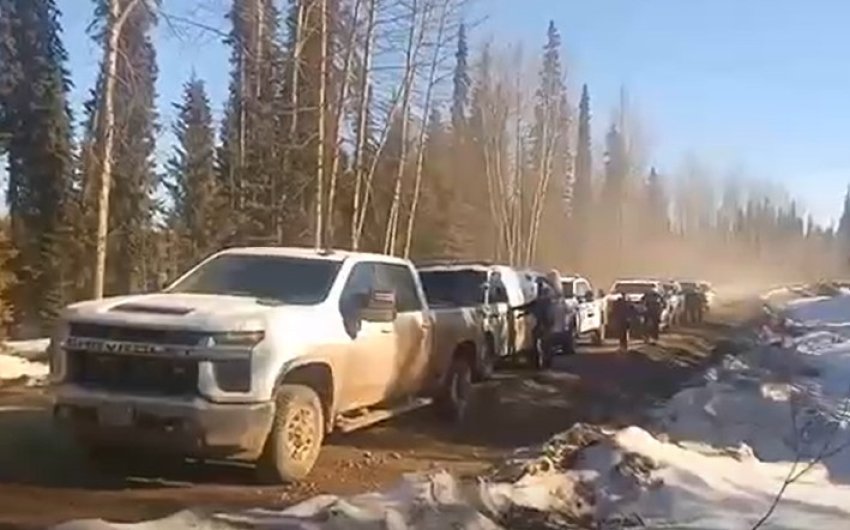
Police officers from Canada's Royal Canadian Mounted Police (RCMP) arrested five land defenders, most of them Indigenous women, in a raid at a camp on unceded Wet'suwet'en territory on March 29.
Gidimt’en checkpoint spokesperson Sleydo’, also known as Molly Wickham, said RCMP officers in multiple vehicles assailed the checkpoint at around 10:30 am and immediately began arresting people. Among those arrested was Gidimt’en Chief Woos’ daughter.
Wet’suwet’en land defenders and Wet’suwet’en hereditary chiefs have been engaged in intense struggles over several years against the Coastal GasLink pipeline being constructed across their territories to connect shale gas sources with two liquefaction and export facilities (LNG Canada and Cedar LNG) in Kitimat on the northwest coast.
Gidimt’en is one of five clans of the Wet’suwet’en Nation. Gidimt'en checkpoint was established to control access to Cas Yikh House territory within the larger Gidimt’en clan territory on the Morice River. In 2020 allies carried out blockades across Canada in solidarity with the Wet’suwet’en.
RCMP claimed in a statement that the arrests were made over allegations of property damage at a building site for the Coastal GasLink pipeline in a nearby area. Yet they have given no information suggesting that the people arrested had anything to do with those allegations. It has only been reported that they were arrested for refusing “to cooperate with police direction” and obstruction of a peace officer. These charges lack credibility given that the RCMP are operating on unceded Indigenous territories and should have no authority against Wet’suwet’en people.
Land defenders claim this is yet another act of intimidation and harassment on behalf of industry. Wet’suwet’en members have already sued the RCMP and Coastal GasLink for alleged harassment and intimidation.
Another bogus C-IRG raid for extractive capital
The Gidimt’en land defenders denounced the raid and called the arrests “bogus”, pointing out that the raid is only the latest of numerous assaults by the British Columbia (BC) RCMP’s Community-Industry Response Group (C-IRG), and a continuation of colonial violence that has always marked Canadian state activities on their lands.
In a statement they said: “This harassment and intimidation is exactly the kind of violence designed to drive us from our homelands. The constant threat of violence and criminalization for merely existing on our own lands must have been what our ancestors felt when Indian agents and RCMP were burning us out of our homes as late as the ‘50s in our area. The colonial project continues at the hands of industry’s private mercenaries — C-IRG.”
As I recently reported, the C-IRG is a special unit of the RCMP which acts as a protection force for capital and corporate extractive projects. The BC RCMP website describes C-IRG as “created in 2017 to provide strategic oversight addressing energy industry incidents and related public order, national security and crime issues.” A secretive unit, C-IRG has been deployed to inflict violence on land defenders in several land defense struggles in different parts of BC.
C-IRG officers have been accused of unlawful behaviors and actions that violate RCMP policies by activists on the ground. A former officer recently spoke out against brutality by C-IRG. The unit’s activities have been so atrocious that the RCMP’s Civilian Review and Complaints Commission (CRCC) is currently investigating C-IRG, for violation of law and policies.More extensively they will be examining whether C-IRG operations violate the Charter of Rights and Freedoms, the United Nations Declaration on the Rights of Indigenous People, and findings of the national inquiry into missing and murdered Indigenous women and girls.
A matter of timing and intimidation
Land defenders have raised questions about the timing of the raid. They point out that the arrests came only days before protests were planned at the annual general meeting of the Royal Bank of Canada (RBC), a main funder of the pipeline.
In a statement, Wet’suwet’en hereditary chief Na’Moks called the RCMP actions “harassment, and exactly what Royal Bank of Canada is funding,” adding: “Ahead of its shareholder meeting next week, RBC continues to fund corporate colonialism, and displace Indigenous peoples from our lands at gunpoint — all for a fracked gas pipeline we cannot afford now or in the future. In the context of the theft of our ancestral land, alleging stolen saws and clothing is outrageous.”
The Union of BC Indian Chiefs (UBCIC) has also spoken out against the raid and arrests:
“These arrests continue the troubling pattern of police intimidation of Indigenous people asserting their rights to access their own territories and rejecting fossil fuel extraction. UBCIC unequivocally stands with those standing up for the title and rights of the hereditary leadership of the Wet’suwet’en."
Abolish C-IRG
Few have any expectation that the CRCC will do anything to impact the operations of the C-IRG. There is no oversight and accountability for policing, which communities need and seek. The state has consistently made its commitments to extractive capital clear and backed that up with funding and with militarised police deployments.
Since the announcement of the CRCC investigation some community groups have come together to form a coalition calling for the outright abolition of the C-IRG. They demanded, in an open letter, that the CRCC order C-IRG be suspended while the investigation is ongoing, and are raising awareness through the #abolishCIRG hashtag.